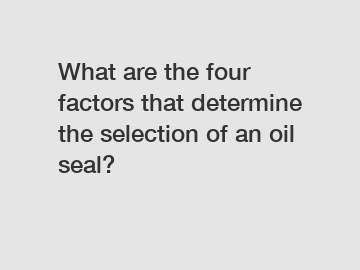Dec. 22, 2023
Mechanical Parts
What are the four factors that determine the selection of an oil seal?
Oil seals play a crucial role in preventing leakage of lubricants and contaminants in various industries. From automotive to manufacturing, oil seals are essential components that ensure the smooth operation of machinery. However, choosing the right oil seal can often be a daunting task. With numerous options available in the market, it is vital to consider four essential factors that determine the selection of an oil seal. Let's delve into these factors and understand their significance in selecting the appropriate oil seal for your application.
1. Temperature Range:

The temperature at which the oil seal will operate is a critical factor in its selection. Different materials are suitable for different temperature ranges. For instance, rubber-based oil seals are ideal for lower temperature applications, typically ranging from -40°C to 100°C. On the other hand, fluoroelastomers excel in high-temperature environments, offering excellent resistance to heat and chemicals. Understanding the temperature range of your application is crucial in selecting an oil seal that can withstand the operating conditions effectively.
2. Pressure Resistance:
The second important factor in determining the selection of an oil seal is its ability to resist pressure. In applications with high-pressure environments, such as hydraulics systems, it is essential to choose oil seals that can withstand the pressure exerted on them without causing leakage. Different designs, such as double-lip seals or radial shaft seals, are specifically engineered to handle varying pressure levels. By considering the pressure resistance capability of the seal, you ensure the longevity and reliability of the equipment.
Further reading:3. Speed and Lubrication:
The rotational speed of the shaft and the type of lubrication used are crucial factors that influence the selection of an oil seal. Higher speeds require oil seals that can withstand centrifugal forces. If the seal cannot cater to the rotational speed, it may result in leakage or damage to the seal lip. Additionally, the type of lubricant used affects the type of oil seal to be chosen. For example, applications involving aggressive chemicals or solvents may require oil seals with special coatings or specific materials that can resist the corrosive effects of the lubricant.
4. Environmental Conditions:
Lastly, the surrounding environmental conditions play a vital role in selecting the appropriate oil seal. Factors such as exposure to sunlight, moisture, chemicals, or other contaminants can significantly impact the performance and lifespan of the seal. In environments with high exposure to UV rays, ozone, or harsh chemicals, it becomes crucial to opt for oil seals that possess excellent resistance. By understanding the environmental conditions, you can choose seals made from suitable materials that provide optimum performance and durability.
In conclusion, when it comes to selecting an oil seal, considering the temperature range, pressure resistance, speed and lubrication, and environmental conditions is vital. By taking these four factors into account, you ensure the correct selection of an oil seal that will effectively prevent leakage, improve performance, and extend the lifespan of your equipment. Whether your application involves automotive, manufacturing, or any other industry where oil seals are essential, making an informed decision in selecting the appropriate oil seal will undoubtedly contribute to the smooth operation of your machinery.
Are you interested in learning more about china oil seal, oil seal catalog, KIA Oil Seal? Contact us today to secure an expert consultation!
Further reading:Previous: Where is a throw out bearing located?
Next: Revolutionize Functionality with Electric Hydraulic Diverter Valve: Your Ultimate Solution
Related Articles
If you are interested in sending in a Guest Blogger Submission,welcome to write for us!
All Comments ( 0 )